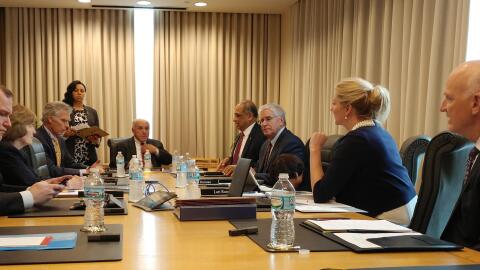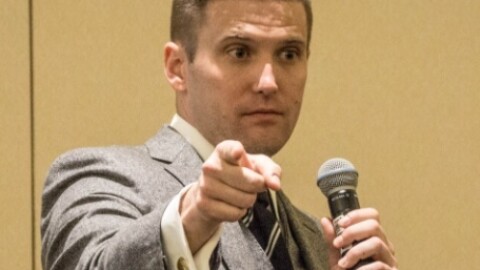Ohio State University has officially denied a request from white nationalist Richard Spencer to speak on campus, while a lawyer for Spencer says University of Cincinnati will allow him to rent a space.
Michigan attorney Kyle Bristow said he would sue both universities if they did not agree by October 13 to give Spencer space to speak. By Friday afternoon, he said that his lawsuits against both Ohio State and the University were "on hold."
Neville G. Pinto, president of the University of Cincinnati, released a statement late Friday confirming that the school will "uphold the First Amendment and allow Richard Spencer to speak on campus."
On Ohio State's side, senior vice president and general counsel Christopher Culley said in a letter to Bristow that the school determined the request "cannot be accommodated without substantial risk to public safety."
However, Culley said the university is currently "considering other alternatives."
Georgia State student Cameron Padgett contacted the schools in September on behalf of the National Policy Institute about renting space for the event. Ohio State officials initially denied the request, saying "it is not possible to accommodate this request without substantial risk to public safety."
The event proposals requested space for a few hundred people, as well as security to deal with a large number of expected protesters.
In his statement, Pinto said that Spencer was not invited by any student, faculty or staff group affiliated with the university. He said the university will work with state and federal law enforcement to implement a security plan for the event.
"After all, we cannot silence those with whom we disagree without opening the doors to our own voices being silenced by those who disagree with us," Pinto wrote.
Mike Brickner, senior policy director of the ACLU of Ohio, said in an interview with WOSU's Clare Roth that the organization isn't representing Spencer in his legal effort. However, the organization believes that members of the public should have access to public forums no matter the content.
"The one thing that we have to keep in mind, certainly, is any speaker going to do something that is not protected by First Amendment law? Are they planning acts of violence or other forms of disruption that would potentially be illegal?" Brickner says. "Certainly universities have to do their due diligence to make sure that if a group is planning to do that, that's taken into consideration when they're issuing permits."
Brickner says even if people disagree with what Spencer says, they should instead use their own First Amendment rights to speak out against it. That means universities and cities should make sure both speakers and protesters are protected, he adds.
"At other public universities, presidents have asked their constituents to steer clear of such events, attempting to deny these attention seekers the spotlight they so desperately desire," Pinto wrote. "Frankly, if or how you engage with Spencer's event is your decision to make, and I will respect and support whatever civil and peaceful course you take."
In April, Spencer and his associates filed a federal lawsuit against Auburn University after they rescinded their invitation. A judge ruled against Auburn and allowed Spencer to speak as planned.
This story will be updated as more information becomes available.
Updated: October 13, 6:17 p.m.






